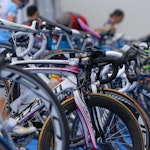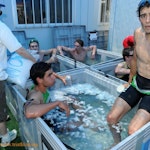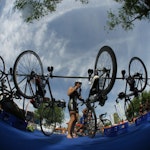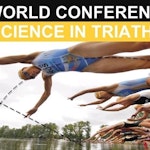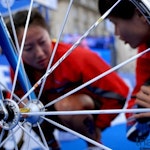First World Conference of Science in Triathlon provides an exciting look to the future
The future of triathlon is in safe scientific hands after the historic first ITU World Conference of Science in Triathlon wrapped-up successfully in Spain this weekend.
Scientists, academics, expert coaches and students gathered together at the University of Alicante to discuss the future of the sport and how science can impact it, with nine keynote lectures delivered by experts in the field plus almost another 100 scientific papers and posters for review.
According to the ITU’s Medical Commitee chair, Dr Sergio Migliorini, the key goal was to help the triathletes to train and perform with healthy practises and the most repeated message was all about minimising injury.
“From the medical point of view the message coming from the conference is that, if we want to minimize the overuse injuries of the lower legs we must improve the running technique, but this is also the best way to improve the running performance,” he said. “Also that coaches must work closely with sports scientists and doctors.”
For keynote speaker Dr Jan Olbrecht, he message he was excited about was that triathlon is still strengthening it’s own sporting identity.
“I think what came up and what is really interesting is that more and more people are of varying consensus that triathlon is something different from other sports,” he said. “You see some studies…they are really doing what sports impact on each other and we will end with triathlon as a real sport, by itself, that’s very important. You cannot train for three disciplines separately and then think you are a triathlete, you have to train for a triathlon.”
Renowned triathlon and running coach Bobby McGee said that he was ‘blown away’ by some of the concepts that were discussed, particularly when it came to new technology.
“Obviously there is lot of new concepts for me in the swim and the bike, but for me I think it was more of a confirmation for me that the direction we need to be going in is neuromuscular in terms of the VO2 kinetics and the speed component of the run,” he said. “It was good to get conformation that we are going down the right avenue. But I think to me that was out of left field, was some of the statistical data in determining our target market and moving in the directions of different distances and disciplines ... and then just being blown away by the level of technology, accelerometers, and picking up such detailed information, particularly in the swim, which is an environment that is traditionally really hard to pick up good data.”
As well as being a world first conference, the set-up itself was also innovative as included the University of Alicante’s undergraduate students adding to the conversation. Dr Olbrecht said it was a perfect way of increasing the contribution of science to triathlon, by engaging the next generation of academics and scientists.
“I like it because in fact these guys are already the future and if they can pick up new things besides what they are learning, which mostly happened five six or 10 years ago, then it makes it much more open for research and new things in their own study,” Olbrecht said. “So I think it is a good thing to mix such people together with expert coaches and scientists because it will certainly motivate them to rethink things, be very critical towards their learning and also build their own knowledge, think of their own ideas and that is very important for innovation.”
Overall, both Dr Olbrecht and Javier Mon Fernandez, a coach and technical adviser to the Mexican Triathlon Federation, said it was amazing just to see so many scientists and experts in the same place and that there was real practical knowledge to be gained.
“I was already surprised by the number of big speakers who were here, mostly for the first time a lot will stand back and see what happens with the congress and say, maybe we’ll come next time, but there were great speakers here and also a very good atmosphere and I think if we could keep that for the future then it will be an exchange that will accelerate the thinking in triathlon and that is really what has to be happening for the future,” Dr Olbrecht said.
Mon Fernandez added “It is a compliment to the organisers for bringing six or seven of the top 10 sport scientists in the world together to share their expertise. Overall I enjoyed the event as a very useful place to network and share and at the same time learn many new things, and make new friends around the world who also work in triathlon and high performance.”
In her final closing address, ITU Secretary General Loreen Barnett said that plans were already underway for the next conference – with it being moved to coincide with the start of the Olympic cycle.
“We will put together a steering committee shortly to begin planning this conference to take place in the first year of the new Olympic cycle, 2013,” Barnett said. Be sure that we will follow a similar structure for the conference as has been established here in Alicante.”
To view the entire programme of Alicante, please click here.
Related articles
-
The ITU's first World Conference of Science in Triathlon starts in Alicante
The first World Conference of Science in Triathlon is underway in Alicante, find out why ITU President Marisol Casado is so excited about the programme.07:34 - 24 Mar, 2011 -
The hottest topics in science and triathlon
Just a week out from the first World Conference of Science and Triathlon, we get a taster by asking some of the keynote speakers to tell us what scientific advancements athletes will actually try-out this year.06:01 - 16 Mar, 2011 -
Programme for Alicante Science Conference released
The official run-down for ITU's first World Conference of Science in Triathlon has been released. Here is a quick look at who is talking about what as the best minds in sports science and triathlon descend on the University of Alicante in Spain.06:15 - 02 Mar, 2011 -
First World Conference of Science in Triathlon Conference
The first World Conference on Science in Triathlon is slated for 24-26 March in Alicante, Spain. Dr. Sergio Migliorini, Chair of the ITU Medical Committee, explains how the conference came about01:18 - 02 Feb, 2011 -
ITU World Conference of Science in Triathlon
World renowned coaches and physiologists are slated to speak at the first World Conference of Science and Triathlon this March in Alicante, Spain.01:00 - 27 Jan, 2011
